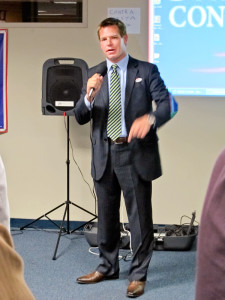
in Pleasanton on Tuesday night.
This past Tuesday, Dublin city councilmember Eric Swalwell celebrated as he nabbed himself a second place spot in the top two congressional primary for the November general election to face off against 21-term member of Congress, Pete Stark.
“The results are still trickling in,” exclaimed Swalwell Tuesday night, jumping the gun early with confidence of his victory. “We are going into November and our momentum is only going to grow, these numbers exceeded our expectations.”
The top two primary system, which was voted into law in 2010 as proposition 14, allows the top two candidates who win the primary to face each other in the November general election regardless of party preference.
Stark finished with less than 50 percent of the vote, garnering 41.8 percent, Swalwell a 36 percent and independent candidate, but ideologically conservative, Chris Pareja finishing with 22.2 percent according to the Secretary of State.
Stark was expected an easy win considering his long history as congressman for over 40 years and never having an adequate challenger to threaten his incumbency. This congressional race wasn’t all that different from previous races until Stark lobbed bribery accusations at Swalwell for taking money from a “Lin family,” a redeveloping family from the Tri-Valley for special redistricting purposes.
Stark was unable to prove that these allegations were true and later retracted his accusation. Since then, local newspaper editorial boards, such as the Bay Area News Group and San Francisco Chronicle, endorsed Swalwell with accompanying stories slamming Stark for his behavior and his long term incumbency. Stark’s campaign took a heavy hit from the controversy, giving way to Swalwell to soak up the media spotlight.
Stark hasn’t campaigned much to maintain his incumbency, just only launching a precinct walk this past weekend with former Ohio congressman Dennis Kucinich. But now with a primary vote that resulted in less than half of the district’s citizens voting for Stark he is expected to come out campaigning more heavily according to San Leandro Mayor Stephen Cassidy who also endorsed Swalwell.
“He can’t ignore it now, he is going to have to campaign when you have less than half of the district voting for you,” said Cassidy.
Swalwell is confident that he will win the general election highlighting the 22 percent of votes that Pareja was able to grab.
“We see that 22 percent very much up for grabs since the third candidate won’t be there. He ran an honorable campaign but we feel now that 22 percent is something we can go after,” said Swalwell.
Alameda County Democratic Chair Robin Torello and endorser of Stark released a press statement yesterday morning concerning the campaign results.
“No one should be surprised about Congressman Pete Stark’s performance. Stark has been a champion for the issues that are important for many years,” said Torello, “Obama didn’t have to make a public endorsement for Stark, as his district will send a Democrat to Washington D.C. regardless. However, President Obama knows he can count on Stark to vote on the important issues – especially healthcare.”
President Barack Obama endorsed Stark last Month.
Torello went on to cite Stark’s experience as reason to re-elect Stark just shortly before quipping at Swalwell’s political inexperience.
“We simply can’t afford to send an inexperienced individual to Congress,” said Torello.
“Voters are not stupid,” said Alex Tourk, Stark’s campaign consultant. “I think when they compare and contrast the two candidates they will see that Stark is the one to vote for. I believe that we will shine through.”
Concerning the Stark and Swalwell controversy Tourk says it is only a “bump in the road” but will not hold Stark from regaining office.
Swalwell has only held political office as a city council member in Dublin for two years and many of his proposed ideas Stark has attacked by citing them as being not very different from what he has proposed over the years as a congressman.
Pareja held his election night party at the Dublin Bar & Grill with supporters in attendance constantly refreshing his laptop’s screen hoping for some sort of positive outcome. He lagged behind Swalwell by 14 percent putting him at third place and thus ending his campaign for Congress.
“We were not surprised by Pete’s numbers, but Eric’s were surprising to us because from what we were hearing on the streets it sounded like only one in forty or fifty knew who Eric was,” said Pareja. “But having low funding and no party behind us I do think that 22 percent rocks. I think if we had more media coverage and were counted as an actual component of the campaign we would had a better shot.”
The general election is November 6, where both Swalwell and Stark will be going head-to-head in what some say is the most competitive Congressional race in the Bay Area.
Chase Thomas contributed research to this report.







